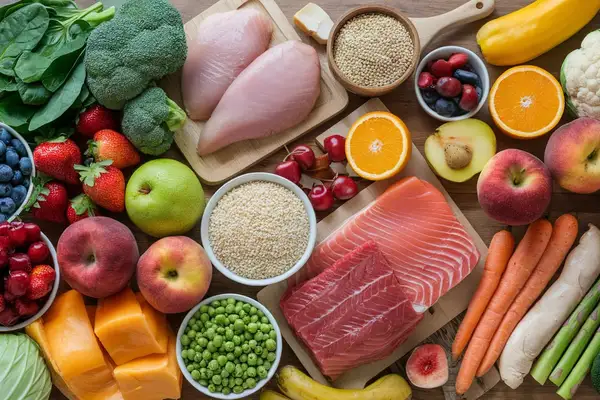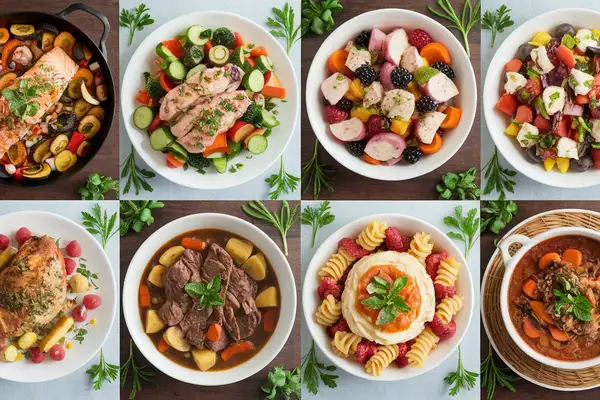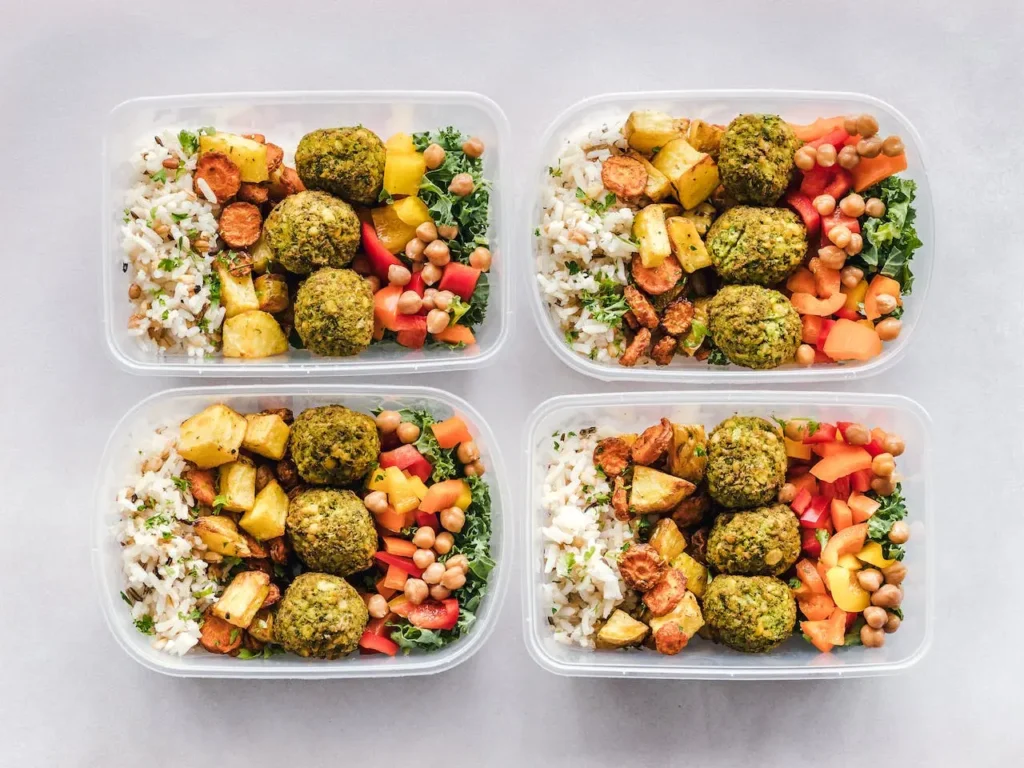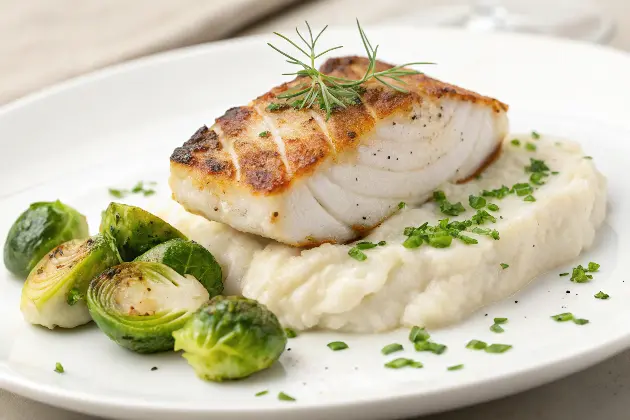The Best 7-Day Hormone Balancing Diet Plan for Women
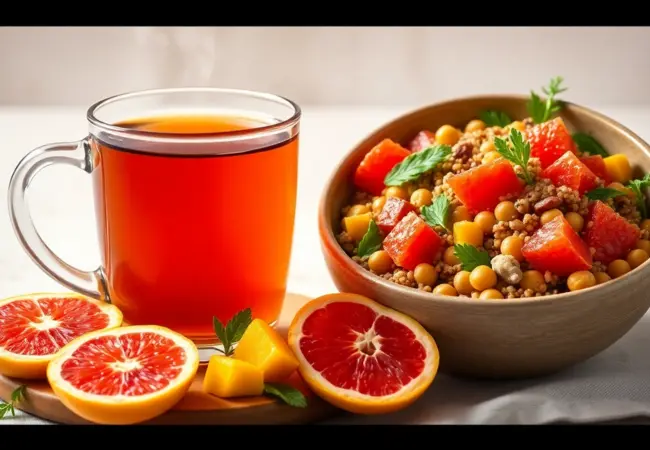
- Common Signs of Hormonal Imbalance
- Key Components of a Hormone Balance Diet
- 7-Day Hormone Balancing Diet Plan for Women
- Foods that Help Balance Hormones
- Foods that Cause Hormone Imbalance
- Hormone Balance Teas
- Vitamins to Balance Hormones for Females
- Best Hormone Balance Supplements
- How to Balance Hormones Naturally
- Final Thoughts
- Frequently Asked Questions
This post may contain affiliate links, meaning I may earn a commission if you make a purchase, at no extra cost to you. I only recommend products I trust. Thank you for your support.
Hormone health refers to the optimal functioning of your body’s endocrine system, the network of glands (like the thyroid, adrenal glands, pancreas, ovaries, and testes) that secrete hormones into the bloodstream.
Your hormones are chemical messengers that regulate many vital processes in the body, including metabolism, reproductive health, and stress response.
Hormonal imbalances can wreak havoc on our bodies, affecting everything from our mood to our weight.
Hormone imbalances occur when your body produces too much or too little of one or more hormones.
Because hormones have wide-ranging effects, even small deviations can lead to noticeable symptoms such as unexpected weight gain, fatigue, mood swings, skin issues, low libido, and more.
But here’s the good news: what you eat can play a huge role in getting those hormones back in check.
A hormone balancing diet focuses on eating whole, nutrient‑dense foods that support your body’s ability to produce, regulate, and clear hormones effectively.
This 7-day hormone balancing diet plan incorporates hormone balancing foods, anti-inflammatory meals, and essential vitamins, giving your body the tools it needs to restore balance.
Common Signs of Hormonal Imbalance
If you are experiencing any of these signs, it may suggest hormonal imbalance:
- Unexplained weight gain or loss
- Mood swings
- Fatigue
- Irregular periods
- Acne or skin issues
- Difficulty sleeping
- Low libido
Key Components of a Hormone Balance Diet
A hormone balancing diet isn’t about restriction, it’s about nourishing your body with the right foods that support hormonal health.
We’re talking nutrient-dense whole foods, healthy fats, and a good balance of proteins and complex carbs.
Incorporating these foods into your diet will help you balance hormones naturally:
- Healthy Fats and Cholesterol: Hormones are made from cholesterol. Healthy fats provide the building blocks for hormone production.
- Fiber: It helps regulate estrogen levels by binding to excess estrogen in the digestive tract and removing it from the body.
- Phytonutrients: Many plant-based foods contain compounds that mimic or influence hormones in the body.
- Antioxidants: They combat oxidative stress, which can disrupt hormone production and function.
- Probiotics: A healthy gut microbiome plays a crucial role in hormone regulation, including the production of neurotransmitters.
- Complex Carbohydrates: They help stabilize blood sugar levels, which in turn helps balance insulin and other hormones.
7-Day Hormone Balancing Diet Plan for Women
This hormone balancing diet plan features healthy foods that naturally regulate estrogen, support hormonal health, and reduce inflammation within just one week.
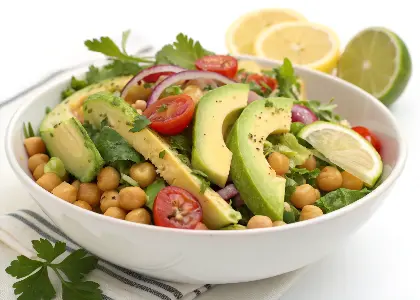
Day 1
Breakfast:
- Cinnamon Apple Cider Gut Tonic: A warm tonic made with apple cider vinegar, cinnamon, and a touch of honey to kickstart your digestion. (1 cup water, 1 tbsp apple cider vinegar, 1/4 tsp cinnamon, 1 tsp honey)
Lunch:
- Chickpea and Avocado Salad with Lemon-Tahini Dressing: A refreshing salad combining chickpeas, avocado, and a tangy lemon-tahini dressing. (1 cup chickpeas, 1/2 avocado, 2 tbsp dressing)
Dinner:
- Grilled Chicken Salad: Combine mixed greens, cucumber, cherry tomatoes, and grilled chicken. Drizzle with olive oil and lemon. (4 oz grilled chicken, 2 cups greens, 1/4 cup cucumber, 1/4 cup cherry tomatoes)
- Mediterranean Stuffed Bell Peppers: Bell peppers stuffed with quinoa, chickpeas, spinach, and feta for a hearty Mediterranean-inspired meal. (2 peppers, 1/2 cup quinoa, 1/4 cup chickpeas, 1/4 cup spinach, 2 tbsp feta)
Snack:
- Maple Roasted Almonds: A handful of almonds roasted with a drizzle of maple syrup for a naturally sweet treat. (1/4 cup almonds, 1 tsp maple syrup)

Day 2
Breakfast:
- White Chocolate Raspberry Overnight Oats: Oats soaked overnight with almond milk, white chocolate chips, and fresh raspberries for a sweet and healthy start. (1/2 cup oats, 1 cup almond milk, 1 tbsp chocolate chips, 1/4 cup raspberries)
Lunch:
- Pomegranate Moroccan Mint Grain Bowl: A vibrant grain bowl with bulgur, pomegranate arils, chickpeas, and mint for a fresh flavor burst. (1/2 cup bulgur, 1/4 cup pomegranate, 1/4 cup chickpeas, 1 tbsp mint)
Dinner:
- Roasted Garlic and Red Pepper Protein Pasta: Whole-grain pasta tossed with roasted garlic, red peppers, and a protein-rich marinara sauce. (1 cup pasta, 1/4 cup sauce, 1/4 cup roasted peppers)
Snack:
- Frozen Yogurt Bites with Berries: Greek yogurt frozen in small portions and topped with mixed berries for a chilled snack. (1/2 cup yogurt, 1/4 cup berries)

Day 3
Breakfast:
- Rosemary Sweet Potato Breakfast Burritos: Sweet potato, eggs, and rosemary wrapped in a whole-grain tortilla for a savory breakfast option. (1/2 cup sweet potato, 2 eggs, 1 tortilla, 1/4 tsp rosemary)
Lunch:
- Caramelized Onion Apple Pecan Salad: A crisp salad featuring caramelized onions, apple slices, and pecans on a bed of arugula. (2 cups arugula, 1/4 cup pecans, 1/4 cup onions, 1/2 apple)
Dinner:
- Thai Chopped Chicken Salad & Peanut Sauce: Chopped chicken over mixed greens with shredded carrots, peanuts, and a creamy peanut dressing. (4 oz chicken, 1 cup greens, 1/4 cup carrots, 1 tbsp peanut dressing)
Snack:
- Spearmint Tea and Kefir with Blackberries and Almonds: A refreshing tea with a side of kefir topped with blackberries and almonds. (1 cup tea, 1/2 cup kefir, 1 tbsp almonds)
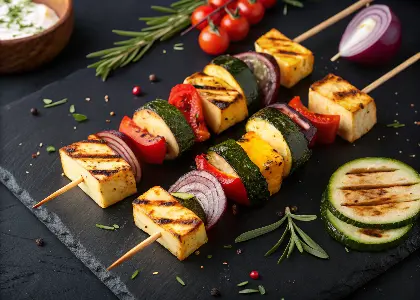
Day 4
Breakfast:
- Orange Turmeric Overnight Oats: Brighten your morning with oats soaked in almond milk, orange zest, and turmeric. (1/2 cup oats, 1 cup almond milk, 1/2 tsp turmeric, 1 tsp orange zest)
Lunch:
- Roasted Winter Salad with Halloumi: Roasted vegetables with seared halloumi and a drizzle of balsamic glaze. (1 cup veggies, 2 slices halloumi)
Dinner:
- Maple Mustard Kale Salad with Crispy Tofu: Kale massaged with maple mustard dressing, topped with crispy baked tofu. (2 cups kale, 4 oz tofu, 1 tbsp dressing)
Snack:
- Chasteberry Tea and Grapefruit: A soothing cup of chasteberry tea with a side of grapefruit slices. (1 cup tea, 1/2 grapefruit)
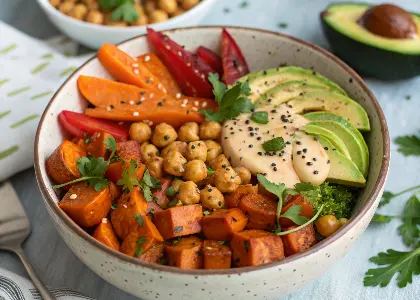
Day 5
Breakfast:
- Crispy Broccolini & Eggs: Broccolini sautéed until crispy and topped with poached eggs. (1 cup broccolini, 2 eggs)
Lunch:
- Mango & Chickpea Quinoa Salad: A refreshing salad with quinoa, mango, chickpeas, and a light dressing. (1/2 cup quinoa, 1/4 cup mango, 1/4 cup chickpeas)
Dinner:
- Winter Buddha Bowl: A hearty bowl with roasted squash, quinoa, kale, and tahini dressing. (1 cup squash, 1/2 cup quinoa, 1 cup kale)
Snack:
- Dark Chocolate and Nuts: A small handful of dark chocolate chips and mixed nuts. (1 oz chocolate, 1/4 cup nuts)
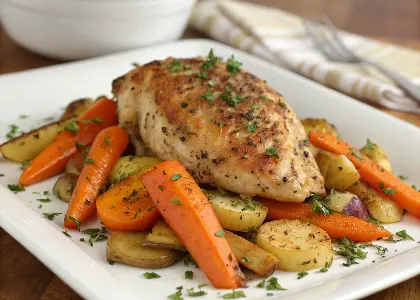
Day 6
Breakfast:
- Pumpkin Spice Warm Smoothie: Blend pumpkin, almond milk, and spices for a warm, comforting smoothie. (1/2 cup pumpkin, 1 cup almond milk, 1/4 tsp spices)
Lunch:
- Tuna Salad Stuffed Avocado with Hot Sauce: Tuna salad served in a halved avocado with a drizzle of hot sauce. (1 avocado, 1/2 cup tuna salad, 1 tsp hot sauce)
Dinner:
- Lemon Herb Chicken with Millet: Chicken seasoned with lemon and herbs, served alongside roasted zucchini and millet. (6 oz chicken, 1/2 cup millet, 1 cup zucchini)
Snack:
- Dandelion Root Tea and Grapefruit: A detoxifying tea paired with fresh grapefruit slices. (1 cup tea, 1/2 grapefruit)

Day 7
Breakfast:
- Smoothie Bowl: Blend frozen berries with almond milk, topped with granola and sliced bananas. (1/2 cup berries, 1/2 cup almond milk, 1/4 cup granola, 1/2 banana)
Lunch:
- Sesame Salmon Salad: Combine mixed greens with baked salmon, sesame seeds, and sesame dressing. (2 cups greens, 4 oz salmon, 1 tbsp sesame seeds)
Dinner:
- Teriyaki Tofu Stir-Fry Bowls with Coconut Rice: Sautéed tofu and vegetables in a teriyaki sauce served over fragrant coconut rice. (4 oz tofu, 1 cup vegetables, 1/2 cup coconut rice)
Snack:
- Protein-Packed Deviled Egg: Hard-boiled egg halves filled with a protein-rich yolk and Greek yogurt mixture. (1 egg, 1 tbsp yogurt)
Foods that Help Balance Hormones
Here are some of the foods that balance hormones in females:
- Leafy Greens: Spinach, kale, and collard greens are rich in magnesium, which helps balance cortisol levels.
- Fatty Fish: Salmon, mackerel, and sardines are high in omega-3 fatty acids, crucial for hormone production.
- Avocados: Packed with healthy fats and fiber, avocados support estrogen balance.
- Nuts and Seeds: Almonds, flaxseeds, and pumpkin seeds provide essential minerals and healthy fats.
- Berries: High in antioxidants, berries help combat inflammation that can disrupt hormone balance.
- Cruciferous Vegetables: Broccoli, cauliflower, and Brussels sprouts contain compounds that support estrogen metabolism.
- Fermented Foods: Yogurt, kefir, and sauerkraut promote gut health, which is closely linked to hormone balance.
- Whole Grains: Quinoa, brown rice, and oats provide fiber and B vitamins that support overall hormonal health.
- Lean Proteins: Chicken, turkey, and legumes provide the building blocks for hormone production.
- Herbs and Spices: Turmeric, ginger, and cinnamon have anti-inflammatory properties that support hormonal balance.
Foods that Cause Hormone Imbalance
While focusing on hormone balancing foods is crucial, it’s equally important to be aware of foods that can potentially disrupt your hormonal balance. Here’s what to minimize or avoid:
- Processed Foods: These often contain additives and preservatives that can interfere with hormone function.
- Refined Sugars: High sugar intake can lead to insulin resistance and hormonal imbalances.
- Excessive Caffeine: While a cup or two of coffee is fine, too much caffeine can stress your adrenal glands.
- Alcohol: Excessive alcohol consumption can disrupt hormone production and metabolism.
- Trans Fats: Found in many processed foods, trans fats can interfere with hormone receptors.
- High-Mercury Fish: Some fish like swordfish and king mackerel can contain high levels of mercury, which can disrupt hormone function.
- Soy Products: For some people, excessive soy intake can affect estrogen levels. Moderation is key.
- Artificial Sweeteners: These can disrupt the gut microbiome, which plays a role in hormone regulation.
Hormone Balance Teas
Herbal teas can be a delicious and effective way to support hormonal balance. Here are some of the best teas known for their hormone balancing properties:
- Chasteberry Tea: Also known as Vitex, this herb is particularly helpful for balancing female hormones and may help with PMS symptoms.
- Spearmint Tea: Studies suggest that spearmint tea can help reduce excess androgen levels, which can be beneficial for women with PCOS.
- Green Tea: Rich in antioxidants, green tea can help support overall endocrine function and may help with weight management.
- Red Raspberry Leaf Tea: This tea is often recommended for women’s reproductive health and may help balance estrogen levels.
- Dong Quai Tea: Known as “female ginseng,” this herb is used in traditional Chinese medicine to balance estrogen levels.
- Ashwagandha Tea: An adaptogenic herb that can help manage stress and support adrenal function, indirectly benefiting overall hormone balance.
- Licorice Root Tea: May help support adrenal function and balance cortisol levels. (Note: Avoid if you have high blood pressure.)
- Stinging Nettle Tea: Rich in minerals, this tea may help support overall endocrine function.
- Lemon Balm Tea: Can help reduce stress and promote relaxation, indirectly supporting hormone balance.
- Rooibos Tea: Rich in antioxidants, this caffeine-free tea may help reduce oxidative stress and support overall health.
Vitamins to Balance Hormones for Females
Certain vitamins play crucial roles in hormone production, regulation, and overall endocrine health. Here are some key vitamins to balance hormones for females:
- Vitamin D: Often called the “sunshine vitamin,” it’s crucial for hormone function and can help balance estrogen levels. Many women are deficient in Vitamin D, so supplementation may be necessary.
- B-Complex Vitamins: These are essential for hormone production and regulation.
- B6: Helps with progesterone production and can reduce PMS symptoms.
- B9 (Folate): Important for estrogen metabolism.
- B12: Supports adrenal function and helps reduce fatigue.
- Vitamin E: Acts as an antioxidant and can help balance estrogen levels.
- Vitamin C: Supports adrenal function and helps in the production of hormones.
- Magnesium: While not a vitamin, this mineral is crucial for hormone balance and is often deficient in many women’s diets.
- Omega-3 Fatty Acids: While not vitamins, these essential fats are crucial for hormone production and reducing inflammation.
Best Hormone Balance Supplements
In addition to a hormone balancing diet, certain supplements can support hormonal balance and hormone health. Here are some of the best hormone balance supplements:
- Maca Root: This Peruvian root is known for its ability to support endocrine function and balance hormones, particularly in menopausal women.
- DIM (Diindolylmethane): A compound found in cruciferous vegetables, DIM can help balance estrogen levels.
- Probiotics: A healthy gut microbiome is crucial for hormone balance. Probiotic supplements can support digestive health and indirectly benefit hormone function.
- Adaptogenic Herbs:
- Ashwagandha: Helps manage stress and supports adrenal function.
- Rhodiola: Can help balance cortisol levels and reduce stress.
- Evening Primrose Oil: Rich in gamma-linolenic acid (GLA), it may help balance prostaglandins and reduce PMS symptoms.
- Inositol: Particularly beneficial for women with PCOS, inositol can help improve insulin sensitivity and regulate menstrual cycles.
- Vitamin D3 + K2: This combination supports bone health and hormone balance, especially in areas with limited sunlight.
- Magnesium: Supports over 300 enzymatic reactions in the body and is crucial for hormone balance.
- Zinc: Important for thyroid function and the production of reproductive hormones.
- Fish Oil: Rich in omega-3 fatty acids, fish oil can help reduce inflammation and support overall hormone health.
How to Balance Hormones Naturally
- Stay Hydrated: Drink plenty of water throughout the day. Proper hydration is crucial for hormone transport and cell communication.
- Manage Stress: Incorporate stress-reduction techniques like meditation, yoga, or deep breathing exercises. Chronic stress can wreak havoc on your hormones.
- Prioritize Sleep: Aim for 7-9 hours of quality sleep each night. Sleep is when your body does much of its hormone regulation and repair work.
- Exercise Regularly: Moderate exercise can help balance hormones. Mix cardio with strength training for best results.
- Limit Exposure to Endocrine Disruptors: Be mindful of plastics, pesticides, and certain personal care products that may contain hormone-disrupting chemicals.
- Consider Supplements: Consult with a healthcare provider about supplements that might support your hormonal health, such as vitamin D, omega-3s, or magnesium.
Final Thoughts
Balancing hormones through diet is achievable with the right approach.
This 7-day hormone balance diet plan is packed with nutrient-rich, anti-inflammatory hormone balancing foods to help you restore hormone health.
Stick to these principles, stay consistent, and pair your hormone balancing diet with healthy lifestyle choices for long-term results and you might notice improvements in your energy levels, mood, sleep quality, and even skin health.
However, keep in mind that everyone’s body is different, and what works for one person may need to be adjusted for another.
If you’re dealing with severe hormonal imbalances or have a pre-existing medical condition, it’s crucial to work with a healthcare provider or a registered dietitian who can tailor a plan specifically to your needs.
Embarking on a hormone balance diet plan is more than just a week-long endeavor; it’s a lifestyle change that can lead to profound improvements in your overall health and well-being.
Lastly, be patient and kind to yourself, hormone balance isn’t achieved overnight but with consistent effort.
- Pescatarian diet for beginners
- 7-day OMAD meal plan
- Cabbage detox soup diet plan
- Whole foods diet for beginners
- Carnivore diet for beginners
- 1200 calorie meal plan for women
- Healthy Blue Zone meals for beginners
- Best diet to manage high blood pressure
- DASH diet dinner recipes
- Easy gluten free meals for celiac disease
- Antioxidant diet for beginners
- 50 easy summer meal ideas
Frequently Asked Questions
What can I drink to balance my hormones?
Green tea, herbal teas (like chamomile or peppermint), and water infused with lemon or cucumber can help reduce inflammation, manage cortisol, and support overall hormone balance.
Which vitamin is best for hormonal imbalance?
Vitamin D is crucial for hormone balance. It acts more like a hormone than a vitamin and affects the function of many other hormones. B-complex vitamins, especially B6, are also important for hormone regulation.
Which fruit is best for hormones?
Berries, especially blueberries and strawberries, are excellent for hormonal health. They’re rich in antioxidants that manage inflammation and support overall hormone function.
Other hormone-friendly fruits include avocados (technically a fruit) for healthy fats and pomegranates for their ability to modulate estrogen levels.
Is egg good for hormonal imbalance?
Yes, eggs can be beneficial for hormonal balance. They’re rich in protein, healthy fats, vitamin D, and choline which are essential for hormone production and regulation.
Can hormonal imbalance be cured?
While “cure” might be a strong word, hormonal imbalances can often be effectively managed and improved through lifestyle changes, including diet, exercise, stress management, and sometimes medication or supplements under medical supervision. The key is identifying the root cause and addressing it holistically.
